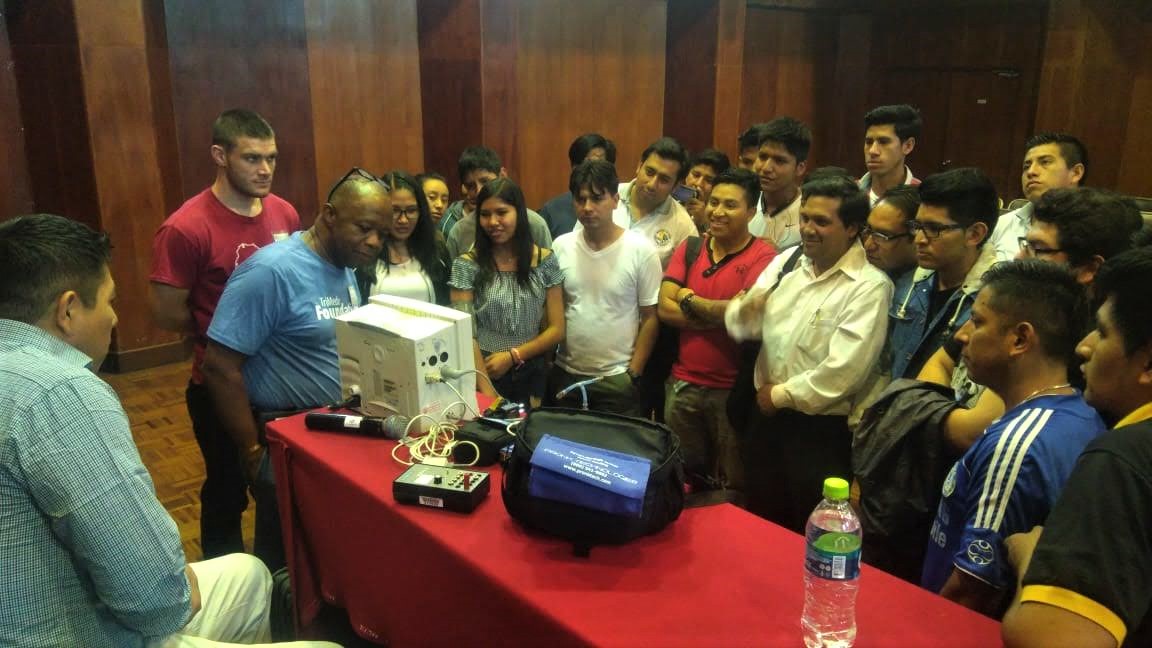Engineers are Key to Surgical Ecosystem
Written by Lindsay Doucette
Increasing access to surgery is a challenging goal in a resource-limited country like Bolivia. We are proud to partner with a diverse and committed community focused on providing life-changing care for patients in need. Increasingly, we’ve used the metaphor of an ecosystem to describe our vast array of surgical services in relation to the surgical patients we serve.
Successful surgical care involves an interconnected web of patients, medical professionals, engineers, utilities, infrastructure, and so on. One key component of the surgical ecosystem is high-value surgical equipment. These machines power our surgical tools, provide vision where our eyes cannot see, and function as a bypass for our most crucial organs. It is critical that they function properly in order to ensure safe surgery. But as with all mechanical equipment, attentive maintenance overseen by well-trained professionals is necessary to keep these machines functioning safely in the operating room.
In Bolivia, safe and affordable surgical care is repeatedly compromised by a lack of functioning surgical equipment. Despite a growing number of motivated engineering professionals, many public hospitals have limited resources for maintaining their equipment.
Missioner, Moses Baryoh, walks students through a technical demonstration at the local college.
In response to this need within the surgical ecosystem in Bolivia, Solidarity Bridge partnered with Indianapolis-based TriMedx Foundation to offer our first Biomedical Engineering Mission Trip. Last week in Cochabamba, the mission team (comprised of engineers Josue Mejia, Moses Baryoh, and Solidarity Bridge staff) was invited to assist in the repair of laparoscopic equipment in the Puente de Solidaridad warehouse, catalogue equipment maintenance needs at two of our partner hospitals, and offer lectures in biomedical engineering at the Universidad del Valle and the Colegio Técnico.
After visiting our partner hospitals and students from the local engineering programs, TriMedx engineer Moses Baryoh shared that he was impressed with the general training and clear dedication of his Bolivian engineering peers. “They are doing the best they can with what they have,” he said. Today, most hospitals have only one or two engineers responsible for maintaining all equipment in the entire hospital. But specialized training in biomedical engineering is slowly picking up steam in Bolivia, a development we are excited to see.
José Choque, whom we lovingly refer to as “our MacGyver,” was thrilled to participate in this mission trip. As the coordinator of equipment and supplies at Puente de Solidaridad, he works closely with our hospital partners to ensure they have what they need to continue offering safe surgery. This can be especially challenging at many of the public hospitals, where most equipment is pre-owned and often outdated to the point that finding the corresponding repair manual or replacement part can cause major difficulty.
José Choque (center) consults with the mission team.
“Here we don’t have the luxury of specializing in one thing. We have to be able to fix everything,” says José. “Our patients depend on it.” Missioners Moses and Josue spent several hours working one-on-one with José, providing crucial mentorship in medical equipment maintenance and repair.
Our goal for this first mission trip was to explore opportunities for partnership and learn about the most pressing needs in this area for our Bolivian partners. The TriMedx Foundation, which is supported by the for-profit TriMedx Clinical Engineering Services, has significant access to engineering professionals working in health care settings throughout the United States. Since 1999, the TriMedx Foundation has provided equipment and technical training and support for resource-poor hospitals around the world.
Despite the equipping, training, and maintenance gaps that exist in the Bolivian surgical ecosystem, this first Biomedical Engineering Mission Trip concluded with mutual sentiments of excitement and hope. We look forward to a growing partnership with the TriMedx Foundation, and to future missions to support this critical component in the delivery of quality surgical care in Bolivia.


